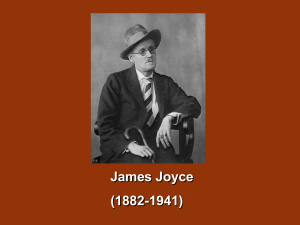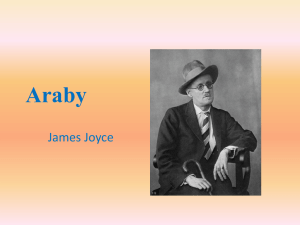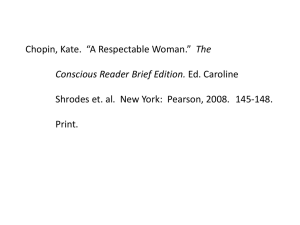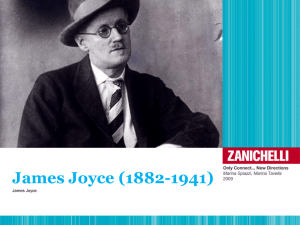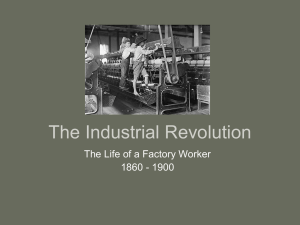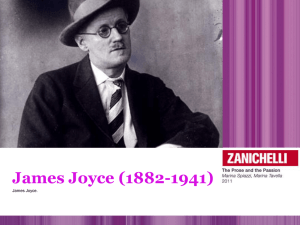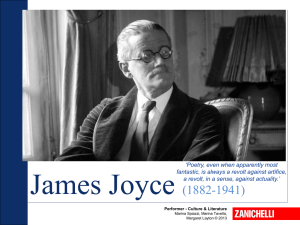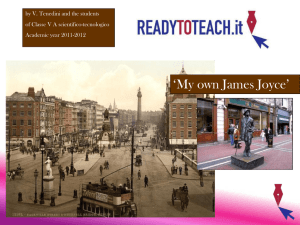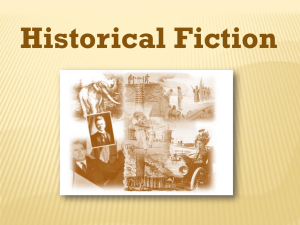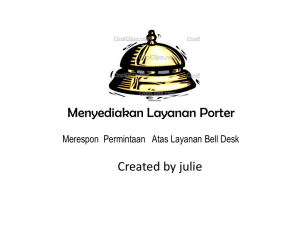Joyces
advertisement
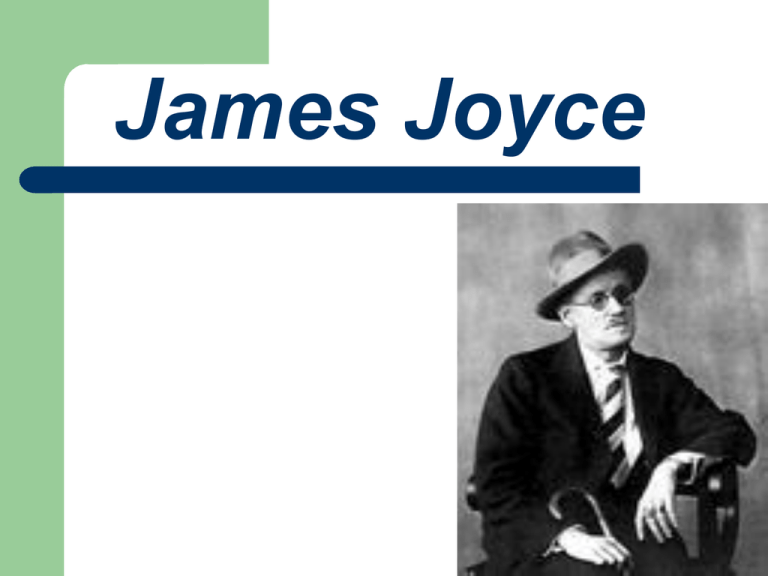
James Joyce Introduction about author James Joyce was born in 1882 in Dublin, Ireland. Joyce's father, John Joyce had a prominent family in Ireland, despite having had two years of college, but he was nothing. Then he organized enterprises and participated in political activities to promote Irish self-government .In 1880, John Joyce turned the corner, in a campaign to obtain a lifelong tax-paid official duties, an annual salary up to£500. Unfortunately, he liked to drink, misappropriation arrears, committed many errors. In 1890 after the fall of Parnell. John Joyce was forced to retire early, when he was 42 years. From then on, the whole family fell in trouble, John Joyce only in words, boasted his own glorious past, while the creditors claims so often .James Joyce hated his father so much When he was young for his selfish, extravagance, as well as his cold to his wives and children . But as age increases, Joyce saw his father's other side - the typical Irish character- Humor, cute,. Joyce loved his father but also because of his Irish national liberation movements Parnell advocated for Irish independence and freedom struggle within the Council. In 1931, John Joyce's death, Joyce told a friend, said: "" Ulysses "in the sense of humor is his (Joyce's father) humor; book characters are all his friends . this book is actually a replica of the person he was. " .Joyce's mother, Mary Jane is a strength and perseverance housewives. Since her husbands bankruptcy of investment and operation, she suffered from the hardships of life. He loved his mother so much but as age increases, Joyce changed view to her. By chance, He realized that his mother's heart not only belongs to his father. He is no longer hostile to his father and no longer love his mother. And even often laugh at his mother's devotion to God . Suspicion, deliberately provocation, and love woven together to form Joyce' attitudes towards women in his later works. At age of six Joyce was taken to the famous Roman Catholic Jesuit-run boarding schools. In 1891, due to family run-down, Joyce was forced to drop out of school. Fortunately in 1893 he returned school with the help of the principal who appreciated his talent very much. During the two years of dropping out of school Joyce stayd at home and studied on his own . Therefore, he soon catch up with the other students, and achieved excellent results. On the final exam to leave school in 1898, a university professor showed him great appreciation and encourage him to climb the peak of literature and art. All these results set his confidence to literature.In high school, Joyce performed so well and he was even a student leader, all people expected that he could be under the formal religious education and be a priesthood in the future to devote to God. Ireland is a Catholic country having a strong religious atmosphere and Joyce was not escaped. However, in the last year in this school, his faith had changed. Joyce began to read at this time a large number of literary books, including British writer Meredith, Thomas Hardy's works, foreign writers Dante, D'Annunzio, Flaubert, Tolstoy's works. Knowledgeable enriched his mind, but also expanded his horizons. He began to suspect his religious beliefs, recognizing that religion is a kind of spiritual shackle while the control of Church is one block of Ireland's revitalization. Since then, he lost interest in school curriculum.Despite all disapproval, 16-year-old Joyce, designed a pursuit of artistic path for himself,abandoning his mother and the school 'hope for him. In 1898, Joyce was admitted to the famous Dublin University where he received a new development, he eagerly read a lot of books, his knowledge had far exceeded his peers. Four years of college life, train Joyce, "aloof off base" character. He advocated that everyone should have an independent thinking, neither to dominate others, nor to dominate the others; the world's people and things must have sufficient autonomy and independence, such as art should be independent of politics, and not subject to the interference of other factors. In 1902, Joyce graduated from Dublin University. In order to make a living, he went to france to learn medical. But things not went as he expected. The poor material life did not daunt Joyce. Spiritual wealth made his life full of confidence.For him, it seems that only to rid of Ireland's religious, political and social lives, could he fully and objectively depict Dublin life. Although most of the time, Joyce was far away from his homeland, the early life experiences in the country had great affects on his later works.. Most of his works are related to Ireland , and alway made it as the background and themes. Most of his novels are rooted in his early life in Dublin, including his family, friends, enemies, secondary school and university years. In January, 1941 this great man passed away in Zurich. Araby James Joyce Important works 乔伊斯的小说公开发表的有4部: ◆《都柏林人》Dubliners(1914,中短篇小说集), ◆《青年艺术家的画像》 A Portrait of the Artist as a Young Man (1916), ◆《尤利西斯》Ulysses(1922) ◆《芬尼根守灵》Finnegans wake(1939) 乔伊斯的文学生涯始于他1904年开始创作的短 篇小说集《都柏林人》。在写给出版商理查兹的 一封信中,他明确地表述了这本书的创作原则: “我的宗旨是要为我国的道德和精神史写下自己 的一章。”这实际上也成了他一生文学追求 的目 标。在乔伊斯眼中,处于大英帝国和天主教会双 重压迫和钳制下的爱尔兰是一个不可救药的国家 *詹姆斯•乔依斯于1904年1月7日,在他母亲逝世之后4个月起在都柏林开始 创作长篇小说《青年艺术家画像》,1914年完稿于意大利的里雅斯特,历时 10年。长篇小说《青年艺术家的画像》有强烈的自传色彩,主要描写都柏林 青年斯蒂芬•迪达勒斯如何试图摆脱妨碍他的发展的各种影响——家庭束缚、 宗教传统和狭隘的民族主义情绪,去追求艺术与美的真谛。乔伊斯通过斯蒂 芬•迪达勒斯的故事,实际上提出了艺术家与社会、与生活的关系问题,并且 饶有趣味地揭示了这样一个事实:斯蒂芬•迪达勒斯本人恰恰就是他力图逃避 的都柏林世界所造就的,都柏林无形中报复了反叛的青年艺术家。 *长篇小说《尤利西斯》是一个平凡的小人物一生中平凡一天的记录,即主 人公广告经纪人利奥波德•布卢姆在1904年6月16日一天的活动。乔伊斯在本 书中将象征主义与自然主义铸于一炉,借用古希腊史诗《奥德修斯》的框架, 把布卢姆一天18小时在都柏林的游荡比作希腊史诗英雄尤利西斯10年的海上 漂泊,使《尤利西斯》具有了现代史诗的概括性。《尤利西斯》以三个人物 为主,除代表庸人主义的布卢姆外,还有他的妻子、代表肉欲主义的莫莉以 及代表虚无主义的青年斯蒂芬•迪达勒斯。小说通过这三个人一天的生活,把 他们的全部历史、全部精神生活和内心世界表现得淋漓尽致。 *长篇小说《芬尼根守夜人》以都柏林近郊一家酒店老板的潜意识和梦幻 为线索,是一部用梦幻的语言写成的梦幻的作品。乔伊斯借用意大利18世纪 思想家维柯关于世界在四种不同社会形态中循环的观点,在此框架中展开庞 杂的内容。书中暗喻《圣经》、莎士比亚、古代宗教、近代历史、都柏林地 方志等,大量借用外国词语甚至自造词汇,通过夸张的联想,喻示爱尔兰乃 至全人类的历史、全宇宙的运动。 *除上述三部作品,乔伊斯还著有诗集《室内乐集》和剧本《流亡者》。 A Portrait of an Artist James Joyce's Portrait of an Artist is one of the most significant literary works of the twentieth century, and one of the most innovative. Its originality shocked contemporary readers on its publication in 1916 who found its treating of the minutiae of daily life as indecorous, and its central character unappealing. Was it art or was it filth? The novel charts the intellectual, moral, and sexual development of Stephen Dedalus, from his childhood listening to his father's stories through his schooldays and adolescence to the brink of adulthood and independence, and his awakening as an artist. Growing up in a Catholic family in Dublin in the final years of the nineteenth century, Stephen's consciousness is forged by Irish history and politics, by Catholicism and culture, language and art. Stephen's story mirrors that of Joyce himself, and the novel is both startlingly realistic and brilliantly crafted, not to mention that it is one of the founding texts of Modernism and the precursor of the acclaimed Ulysses. For this edition Jeri Johnson, an eminent Joyce scholar, has written an introduction and notes which together provide a comprehensive and illuminating appreciation of Joyce's artistry. content 《阿拉比》(Araby)是《都柏林人》的短篇小说集的第三篇作品,是詹 姆斯•乔伊斯早期现实主义小说中的一篇,充满显露乔伊斯在意识流方面的才 华。阿拉比是1894年5月14日都柏林曾经举办过一场名为(大东方节庆) (Grand Oriental Fete)的市集活动,接连举办6天,阿拉比代表充满神秘 的东方想像。作品中的“我”是一个天真无邪,正在长大的孩子,其实也是 乔伊丝童年的经历,他住在“李奇蒙北街”的死巷里。处于青春期的他,对 爱情开始有了朦胧的感觉,他喜欢上邻居「曼根的姊姊」,却不知道如何 “向她表白我那神魂颠倒的思慕之情”。 有一天女孩告诉他“阿拉比”集市是个好处去,但她又说,“她不能去, 因为那个星期她的教会有一个静修活动。”男孩渴望在阿拉比集市为“曼庚 的姊姊”买件礼物。当星期六终于来到时,早先答应给他钱的叔叔却迟迟还 没下班。随后又因火车耽误了时间。最后,他花了一先令,好不容易进了集 市,此刻,大厅里已是一片昏暗,大多数的摊位都收摊了,他走到一个摊子 前,挑著看一些瓷器花瓶和一些烧有花朵图案的茶具。一位小姐和两位年轻 人正在谈天说笑,小姐问他要买什么?他回答「没有,谢谢你。」小姐又回 去和那两位年轻人聊天。 不久集市将要熄灯,大厅的上半部现在已经完全暗了下来。他觉得自己 像一只被虚荣心驱使与嘲弄的可怜虫,他感到了深深的痛苦。 ("Gazing up into the darkness I saw myself as a creature driven and derided by vanity; and my eyes burned with anguish and anger.") Description of environment The setting of Araby is immensely important; dreary, dark .Dublin is the living, symbolic backdrop for the story.The gloomy atmosphere of North Richmond street that actually sets the scene at the start of the story is an anticipation of what lies ahead for the little boy in the bazaar of Araby. The first sentence of the story lets us know that North Richmond street is "blind," and that the Christian Brothers’ School did not so much dismiss students for the day as "set them free." A quick scan of the important adjectives in the first paragraph -- "blind," "quiet," "uninhabited," "detached," "square," "decent," "brown," "imperturbable" -- quickly presents a world that is practical, simple, and unmiigatingly stultifying. As mentioned before, the boys who play in the neighborhood are able, somehow, to discover some beauty and wander even from these simple surroundings, but to do so they must become connoisseurs of darkness: the lanterns on North Richmond are "feeble," the lanes are "dark" and "muddy," the houses “ sombre ” in the winter twilight, the "dark dripping gardens" redolent with the smell coming from their “ashpits.” This description of the street and the lives the boys live on it serve as the backdrop that we will use to understand how much more imaginative the Araby market will be or will not be . Of course, the story’s greatest irony is just how misnamed the Araby market is. It is certainly not a wondrous evocation of the West’s idealized and romanticized notions of the Middle East. Rather, it is exactly the sort of disappointing market you would expect to appear in the Dublin Joyce describes. It is dark, and mostly empty, and hushed, and more about money than anything else. The market at the end of the story, by more resembling the rest of his life than the image of it he had conjured in his daydreams, forces the narrator to a bleak realization: the stark realities of day-to-day living have little to do with the romantic notions we carry in our heads. The function of the environmental description 1.In the third paragraph Joyce creates a dim, drab, dreary, lifeless image one that seems to express unhappiness. The narrator uses such words as, “dark”, “dusk”, “feeble”, “shadow” and “somber”. It is possible that the narrator uses 2.Joyce invites the reader into a dead priests drawing room, giving the reader great detailed description that plays on our senses. This description of the priest’s room allows us to look deeper into the character of the priest. The reader is provided with a clear, concise description, “curled and damp” pages, the “wild garden behind the house…contained a central apple tree.” When the narrator mentions the “curled and damp” pages he is referring to the collection of book he found in the drawing room that belonged to the priest. We know the priest read these books frequently due to their “curled”, “damp”, “yellow” pages which suggests they have been read many time and exposed to sunlight. The Abbot, The Devout Communicant and The Memoirs of Vidocq were not considered to be suitable reading material for a priest due to their romantic nature, especially the latter that was written by a man who spent his life in the sexual conquest of a woman. This causes the narrator to have mixed emotions towards his love for the girl, his love for religion and also his love for materialistic items. The “wild garden” in the back yard that can be seen from the window inside the room, is alluding to the Garden of Eden. In this paragraph there is also reference to the priest as being “very charitable”. In saying this the narrator is condemning the church and the priest as a hypocrite. When Araby was written it was understood that the priest was supposed to share and give generously to institutions as was required and not to keep them for his own selfish purposes. In bringing these issues to the surface the narrator was successful in presenting all Dubliners Analysis of main characters The Character Of The Boy In The Story 'Araby' The school boy, in the story 'Araby", is the narrator of the story. He has not yet attained majority and is by nature bashful. He lived alone with his auntie and uncle and knew a few play-mates with whom he played in the street. Mangan's sister was perhaps only girl who lived in his neighborhood. He started appreciating her figure and dress without actually realizing that he had grown to like her. With the passage of time this liking developed into a passion. Being preadolescent person he had not become conscious that such a passion is just natural and it foes not call for apology or regrets. If he had expressed his noble feeling of love for the girl he might have been able to overcome his bashfulness. Once he hesitated in expressing his sentiments, he developed an inhibition with the result that he was never able to make his feelings known to her. He went worshipping her silently. By chance, she happened to be talk to him, he felt confused and did not know how to express himself. His desire to visit Araby became an obsession for him and he made up his mind to go to the market at the earliest and bring a gift for her. The hour that he reached Araby, was not at all fit for purchasing something really worthwhile. He experienced a sort of bitterness even worse than defeat. Being a lonely person, he is in search of a kindred soul. But lacking self-confidence he is not able to win her, as any other person without inhibition could have done so easily. The boy in the story is so bashful and inept in his relation with Manager's sister only. He was quite a sociable boy in his own way and was good at studies. His auntie and uncle never discovered any oddity about him. He certainly proved quite helpful when he accompanied his aunt on her shopping trips. After his missed venture with Araby he lost interest in his studies. His teacher stared feeling concerned about him. But he did not know the real reason for this lack of interest in his studies. He is a hardworking and responsible boy and is capable of changing his attitude in keeping with the changing conditions. His unrequited love has proved disappointing experience for him, but certainly it would have made him wiser and more practical in future. Writing Techniques Symbolism Impressionism Epiphany Symbolism As in the novel Araby, James Joyce used large amounts of symbolic imageries to create a typical setting, help the plots develop and indicate the hero’s characteristics. By analyzing the symbols in Araby, we can have a deep insight into the story and know the main theme in Dubliners better. And the symbols are as follows: 1. Blind The North Richard Street was “blind”, and “I” used a blind to hide myself from being seen by Mangan’s sister. These are the two “blind” used in the novel. The first one is an adjective, which means that the street is closed at one end. As it’s a blind street, people living in the street are difficult to communicate with the ones outside. So it indicates the station of unopen up of Dublin as well as Ireland. But the people living in the street are all pleased with the situation. [2] So the boy wished to get away from it. This helps the plot develop. As for the second “blind”, it is a noun. By using the blind, Mangan’s sister couldn’t see me. However, the blind also prevented me from seeing her clearly. This indicates that the boy’s dream was only a childish dream (Mangan’s sister); it is hard to be realized for “I” only “watched it from a blind”. 2. Mangan’s sister Mangan’s sister was the girl to whom “I” had paid lots of attention; “I” watched her secretly; “I kept her brown figure always in my eye”; and when “I” was doing stranger prayers that “I” didn’t understand, her name sprang to my lips. These are all telling that Mangan’s sister is the boy’s dream, or his idol. But in the whole novel, the girl’s name hasn’t appeared. Why? Because what “I” know about my dream is only something superficial. My dream is just like the temple in the air, forming in the boy’s mind without any deep thinking or any deep understanding. “I” liked Mangan’s sister just as I liked The Memoirs of Vidocq, a book I found in the priest’s remains--“I liked the last best because its leaves were yellow.” This agrees with the boy’s age and his experience. He was a boy on the way of growing up and forming his own views of the society. But he was still too young to have a good understanding of the real world. Although we know that his dream could be easily broken, the most important thing is that he had a dream. This is also important for the Irishmen who were under the control of the British government then. 3. The North Richmond Street The street was blind. Besides, the surroundings were all unpleasant. My house was full of “musty air”. The houses in the street “had grown sombre”. When my aunt and “I” went marketing, we were “jostled by drunken men and bargaining women, amid the curse…” As James Joyce said, the main theme of the novels in Dubliners was paralysis. And the condition of the North Richmond Street was a good proof for it. But in the whole Ireland as well, all the streets were almost the same. So Joyce turned to voluntary-exile to get rid of the unpleasant thing in Ireland. So do the boy in the novel. He had a strong hatred for the 4. Araby In the novel, the word “Araby” plays an important role, as it is the title word. And Araby is “a splendid bazaar” where Mangan’s sister recommended me to go. Araby is an old name for Arab. Besides, in the novel, it “cast an Eastern enchantment over me”. So Araby is a place with the Oriental fragrance in Dublin. And we can also see that the boy had a strong desire to make a trip there. So we can conclude that Araby is a dream new world for the boy, as Mangan’s sister is a fairy who guild the boy there. However, it seems that the other people, especially the elder people living in the street paid little attention to my desire. And my uncle just “answered me curtly” when “I” told him my plan to Araby. And he also went home too late that night to let me go to Araby on time. So this indicates again that Dubliners as well as the Irishmen were all paralyzed. They paid little attention to their dreams. And they were well intentioned but narrow in the views and blind to higher values. This is what Joyce felt disappointed of. To our delight, my aunt indeed cared about my wish for Araby and blamed my uncle for being late. To our delight, my aunt indeed cared about my wish for Araby and blamed my uncle for being late. This shows that Joyce want to hold his wish for the future of Ireland. And when “I” got a florin from my uncle, “I” went to Araby immediately. However on my way there, the condition seemed to be a bit unpleasant. The train was “deserted”, “bare” and it had “an intolerable delay”. Even when the train started “slowly”, “it crept onward among ruinous houses”. These all indicate the difficulties one will confront on his way to the dream place. But anyhow at last “I” arrived at Araby late at night. But Araby, the dream new world for the boy, turned out to be “darkness” and “silence”. And the people who served me at the stall spoke to her customer “out of a sense of duty”. This all disappointed me. And there is a casual dialogue between two men and a woman in the novel. This dialogue had no special setting or surprising ending, but it was so real that when we read the words, we can imagine the scene in our mind. But it is the dialogue, in addition with the other things the boy met in Araby, that disappointed me. So this is an allusion of the life of the young adults in Dublin who own the characteristic of ignorance and conventionalism. One the whole, the bazaar Araby indicates that even when the Irishmen were chasing their dream, they would be disappointed just because of their own society and their blind to the bright future. So Joyce became sad about the reality. 5. The priest At the beginning of the novel, we know that a priest had been a tenant of the boy’s home. “He (the priest) had been a very charitable priest”, and he “had left all his money to the institutions and the furniture of his house to his sister”. So in this way, the priest was indeed a good citizen of Dublin. Besides, form the names of the books that “I” found, (The Abbot, The Devout Communicant and The Memoirs of Vidocq), of which one is about religion and two are about exploration, we can see that the priest was also an imaginative person. So he had given his life to both piety and flights of imaginations. However, the priest had gone, just like his “rusty bicycle-pump”, deserted and forgotten by other Dubliners. If all the good citizens had all gone away, how could Dublin be a good city? So the priest is a symbol of ht vital past, a contrast to the “blind” and paralyzed present. It tells us that the freedom of the Ireland has gone and people then had no passion for a bright future. On the other hand, the priest was also a symbol for religion belief because of his special status. In fact from the analysis before, we know that the priest was a man full of imagination. But in fact, a priest should be conventional. So this imaginative priest indicates Joyce’s doubt of the belief of Catholicism. 6. Other subtle Symbols Besides the major symbols in Araby, there are still some subtle ones that could not be ignored. At the beginning of the novel, we can see “a central apple tree” in a “wild garden behind the house”. On seeing the words “Apple tree”, we can immediately think of the myth between Adam and Swan in the Garden of Eden. In this novel, the apple tree id a symbol for the boy’s first love as well as a wish to try something new. [5] But the tree was in a “wild garden behind the house”. The condition was so oppressed that the tree might not grow up robustly. This means that a trial for a new thing wasn’t encouraged by the Irish society, and the boy’s love towards Mangan’s sister couldn’t breed some results. Also at the beginning, “light form the kitchen windows had filled the areas”. (There are also some other descriptions of the light, such as “Some distant lamp or lighted window gleamed over me.”) From the analysis before, we know that the dark blind street is a symbol for Ireland. So here the light becomes a symbol for the country’s future. However, the light was from the kitchen window. How dim, how subtle! So Joyce here indicates the gloomy future for his own country. Besides, the “chalice” is mentioned when “I” went marketing with my aunt: “I imagined that I bore my chalice safely through the throng of foes.” Here the “chalice” is a symbol for the belief of Impressionism 作品中的印象主义色彩: 乔伊斯是一个十分善长揭示人物内心世界的作家,他的作品通常具有十分浓郁的印象 主义色彩。印象主义,即通过对人物瞬间的感观印象,特别是对视觉上对光、影、色 的感受,形象地表现个人精神领域中朦胧的感性活动。在《阿拉比》中,乔伊斯在描 述主人公的爱情心理时,并没有直接描述主人公的心理活动,而是通过主人公所看到 的,所听到的,带领读者一起去体会主人公的情感世界。例如,作品中有这样的一段 描写: “While she spoke she turned a silver bracelet round and round her wrist. She could not go, she said, because there would be a retreat that week in her convent. Her brother and two other boys were fighting for their caps and I was alone at the railing. She held one of the spikes, bowing her head towards me. The light from the lamp opposite our door caught the white curve of her neck, lit up her hair that rested there and, falling, lit up the hand upon the railing. It fell over one side of her dress and caught the white border of a petticoat, just visible as she stood at ease.” 这段描写是主人公第一次听到“阿拉比”这个名字那一瞬间,也是他第一次和心目中 的姑娘谈话时,所看到的情景。乔伊通过“我”对光、影、色的自我感观印象,为读 者描述了一幅只有通过主人公的眼睛才能看到的美丽图画。我们甚至能够从中读出主 人公视线的移动,这是主人公内心世界的一面镜子,真实的反映了他的浪漫心理和对 爱情的渴望。虽然他没有心灵独白,但是他的心理活动却象一副画一样直观清淅。我 们已经明白,只有恋爱中的人看他的恋人时,也只有怀有浪漫情怀的人,才能留有这 种印象。乔伊斯通过人物瞬间的美好感受,并选择这一时刻作为“阿拉比”的首次出 现,恰当又生动的揭示了一个少年的初恋情怀。这样,主人公把“阿拉比”当成浪漫 与理想之地也显得十分有说服力。没有激情或感叹的语言,没有任何比喻,只有光、 影、色,一切是这样的平淡与真实。乔伊斯通过对主人公瞬间印象的描写,把读者领 入了主人公的内心世界。 Epiphany “ Epiphany ”is a religious word ,which is first put into literary use by James Joyce who uses the “ Theory of Epiphany” to explain an aesthetic process of the stages of artistic creation. “Theory of Epiphany ” emphasizes that “epiphany” in the creation of modern novels usually breaks the traditional order of time and space , radiating both objective and subjective aesthetic images. James Joyce practises his own theory and employs“Epiphany”to the utmost in Dubliners. Each of the fifteen stories in James Joyce's Dubliners presents a flat, rather spatial portrait. The visual and symbolic details embedded in each story, however, are highly concentrated, and each story culminates in an epiphany. In Joycean terms, an epiphany is a moment when the essence of a character is revealed , when all the forces that bear on his life converge, and we can, in that instant, understand him. Each story in the collection is centered in an epiphany, and each story is concerned with some failure or deception, which results in realization and disillusionment. “ Araby " follows this pattern. The meaning is revealed in a young boy's psychic journey from first love to despair and disappointment, and the theme is found in the boy's discovery of the discrepancy between the real and the ideal in life. The story opens with a description of North Richmond Street, a "blind," "cold ... .. silent" street where the houses "gazed at one an-other with brown imperturbable faces." It is a street of fixed, decaying conformity and false piety. The boy's house contains the same sense of a dead present and a lost past. The former tenant, a priest ,died in the back room of the house, and his legacy-several old yellowed books, which the boy enjoys leafing through because they are old, and a bicycle pump rusting in the back yard-become symbols of the intellectual and religious vitality of the past. The boy, in the midst of such decay and spiritual paralysis, experiences the confused idealism and dreams of first love and his awakening becomes incompatible with and in ironic contrast to the staid world about him. Every morning before school the boy lies on the floor in the front parlor peeking out through a crack in the blind of the door,watching and waiting for the girl next door to emerge from her house and walk to school. He is shy and still boyish. He follows her, walks silently past, not daring to speak, overcome with a confused sense of sensual desire and religious adoration. In his mind she is both a saint to be worshipped and a woman to be desired. His eyes are "often full of tears," and one evening he goes to the back room where the priest had died. Clasping the palms of his hands together, he murmurs, "0love! 0 love!" in a prayer not Walking with his aunt to shop on Saturday evenings he imagines that the girl's image accompanies him ,and that he protects her in "places the most hostile to romance." In the mixed symbolism of the Christian and the Romantic or Oriental myths Joyce reveals the epiphany in the story: "These noises converged in a single sensation of life for me: I imagined that I bore my chalice safely through a throng of foes." He is unable to talk to the girl. Drifting away from his schoolmates' boyish games, the boy has fantasies in his isolation, in the ecstasy and pain of first love. Finally the girl speaks to the boy. She asks him if he is going to Araby. He replies that if he does he will bring her a gift, and from that moment, his thoughts upon the mixed imagery of the saintly light upon her hair and the potential sensuality of "the white border of apetticoat", the boy cannot sleep or study. The word Araby "cast an Eastern enchantment" over him, and then on the night he is to go to the bazaar his uncle neglects to return home. Neither the aunt nor uncle understands the boy's need and anguish, and thus his isolation is deepened. We begin to see that the story is not so much a story of love as it is a rendition of the world in which the boy lives. The second part of the story depicts the boy's inevitable disappointment and realization. In such an atmosphere of "blindness"-the aunt and uncle unaware of the boy's anguish, the girl not con-scious of the boy's love, and the boy himself blind to the true nature of his lovethe words "hostile to romance" take on ironic overtones. These overtones deepen when the boy arrives too late at the bazaar.It is closing and the hall is "in darkness." He recognizes "a silence like that which prevades a church after a service" but the bazaar is dirty and disappointing. Two men are "counting money on a salver "and he listens "to the fall of the coins." A young lady, bored with him and interested in two men who are flirting with her, cheapens and destroys the boy's sense of an "Eastern enchantment." His love , like his quest for a gift to draw the girl to him in an unfriendly world , ends with his realizing that his love existed only in his mind. Thus the theme of the story-the discrepancy between the real and the ideal-is made final in the bazaar, a place of tawdry make-believe .The epiphany in which the boy lives a dream in spite of the ugly and the worldly is brought to its inevitable conclusion: the single sensation of life disintegrates. The boy senses the falsity of his dreams and his eyes burn "with anguish and anger." Supplementary Knowledge Stream of consciousness Stream of consciousness refers to the flow of thoughts in the conscious mind. The full range of thoughts that one can be aware of can form the content of this stream, not just verbal thoughts. Commonly used experimental techniques, including selfreporting, gives easier access to verbal thoughts than to thoughts more closely connected to senses other than hearing and activities other than speaking and writing. 小组成员 帅小云 刘 洁 薛耀珍 徐亚男 李晓燕 姜丑芳 王微红 栗倩倩 刘 晶 冯丽娟 Thanks all !
